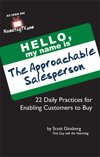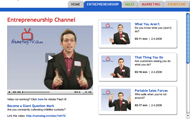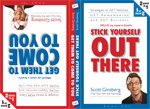A song that chokes me up almost every time I hear it is, “Walkway,” by Ben Harper.
In the chorus, he sings:
With so many people to love in my life, why do I worry about one?
But you put the happy in my ness; you put the shine in my sun.
And it’s so hard to do, and so easy to say.
But sometimes, sometimes, you just have to walk away.
Walk away from toxic environments.
Walk away from broken relationships.
Walk away from valueless affiliations.
Walk away from soul-sucking activities.
Walk away from burdensome obligations.
Walk away from unfulfilling opportunities.
If you’ve been getting the sneaking suspicion that it’s time to quit something, someone or somewhere, consider these suggestions to get your feet moving in the right direction:1. Watch for the warning signs. People walk away for two reasons: Either because it’s hard, or because it’s right. Your challenge is to create a filter. To make an agreement with yourself that, upon feeling certain feelings, you’re gone.
Here’s a few from my own list, with some help from my daily Facebook fill in the blank exercise.
If you’re not waking up happy, it’s time to walk away.
If growing is no longer possible, it’s time to walk away.
If even the truth sounds like a lie, it’s time to walk away.
If sticking around is holding you back, it’s time to walk away.
If money is the only thing keeping you around, it’s time to walk away.
If the pain of holding on exceeds the risk of letting go, it’s time to walk away.
If you secretly realize that you’ve been settling for mediocrity all along, it’s time to walk away.
Ultimately, it’s not about saying no – it’s about setting healthy boundaries. It’s not about giving up – it’s about recognizing a completed life cycle. And it’s not about being selfish – it’s about being aware of yourself, staying loyal to yourself and having respect for yourself. How will you know when it’s time to walk away?
2. Walking away makes room. In an articled called Sometimes Your Happiness Depends on Walking Away, Kristen Houghton explained that too often we focus so much on a door that has closed abruptly and unexpectedly in our faces that we don’t realize that the world is full of other doors that are open to us.
“Letting go of what occurred and walking away from a closed door is difficult. It is human nature to want to stop and bang on that door in the fierce hope that it will open up again and let us in. But you won’t find your happiness demanding that a locked door reopen. All you will do is miss alternate avenues of opportunities that are available to you.”
That’s what I’ve learned in my own walkaway experiences: Sometimes we have to say no the good to create room to say yes to the best. Besides: Terminated from a job doesn’t mean terminated from life. Breaking up with your girlfriend doesn’t mean you’re a broken person. And ending your affiliation with an organization that’s outlived its usefulness doesn’t make you selfish.
But, if you’re in danger of becoming someone you don’t like, you need to walk away. Otherwise you’ll sabotage your chances of evolving into something better. Are you bloodying your knuckles knocking on a locked door that’s closed from the other side?
3. Prepare yourself for the onslaught of emotion. Walking away from anything is a painful rope to cut. Especially when it involves someone you love – or something central to your identity. Personally, I once divorced myself from an entire group of close friends that I’d known since childhood.
The reason: They thought cocaine was cool – I didn’t.
So I bailed. And the next day, I experienced a bona-fide anxiety attack. You know, the kind that makes you feel like the entire world is closing in on your lungs? That’s how my body responded to walking away. Which isn’t entirely surprising, as relationships are fundamental to my Personal Constitution.
What’s interesting, though, is that none of my old friends ever called to ask where I was. Apparently, my absence wasn’t enough to warrant any follow up. Weird. I think that’s the hardest part about walking away: Knowing in your heart that people aren’t going to come chasing after you.
Fortunately, the few close friends I had left helped me navigate the pain. And I made it out alive. That’s the good news: Walking away from a closed door usually helps you find a key to open a new one. As Shakespeare said, “To thine own self be true – not to thine own group of friends you don’t even like anymore be true.” How will walking away make you feel – really?
4. Scratch your itch elsewhere. It’s always easier to walk away from something if you view it as a springboard. As a stepping-stone to something better. Take organizational involvement, for example. From faith communities to volunteer positions to professional associations, too often we’re afraid to throw in the towel – even when we’ve passed the point of diminishing returns.
We’ve simply invested too much emotional labor, and walking away would be too painful.
Which makes total sense. I’ve certainly been guilty of sticking around somewhere for too long out of guilt. But life’s too short to shackle yourself to an unfulfilling, unrewarding affiliation you’ve outgrown, just for the sake of sparing somebody’s feelings.
My suggestion: Instead of throwing a life jacket to something that’s already sunk to the bottom of the ocean – find somewhere else to swim. Instead of working overtime to convince yourself that your membership is worthwhile – find a better sandbox where you can be somebody.
Look: It’s never pleasant when you realize that something you love has outlived its usefulness. But everything on this planet has a lifestyle. Maybe it’s time to celebrate your victories, walk off the field and step into something better. Are you willing to confront your organizational expiration date?
5. Focus yourself to free yourself. Never feel bad about saying no to the people who haven’t learned how to value you yet. Life’s too short, and you’ve got shit to do.
For example, I recently met with a company who wanted to hire me to conduct a branding workshop with their employees. For the first fifteen minutes of the meeting, everything was going great: My philosophy engaged them, my content excited them and they seemed ready to move forward.
Until one of the executives said, “By the way Scott, we don’t allow facial hair in this building. Or blue jeans. Or open toed shoes. Oh, and your hair is way too long. Just a few things to keep in mind before you come back to our office again.”
I never came back.
In fact, the only time I talked to them again was in my email the next day, in which I wrote the following: “Thanks for your interest in my program. Although it seems that my content is the right fit for your team, it’s clear that my personality is not. And while I respect the culture of your organization – I don’t edit myself. Ever. Here’s the name of a colleague who might be a better fit. Hope she works out.”
Lesson learned: You’re defined by what you decline. How much money are you willing to turn down to preserve your integrity?
REMEMBER: Walking away isn’t just about saying no.
It’s about standing aware of yourself.
It’s about showing respect to yourself.
It’s about staying honest with yourself.
It’s about setting boundaries for yourself.
The best part is, when you walk away from the wrong, it frees you to sprint toward the right.
LET ME ASK YA THIS…
Are you ready to get the steppin?
LET ME SUGGEST THIS…
For a list called, “16 Ways to be the Best,” send an email to me, and you win the list for free!
* * * *
Scott Ginsberg
That Guy with the Nametag
Author, Speaker, Entrepreneur, Mentor
[email protected]
 “I usually refuse to pay for mentoring. But after Scott’s first brain rental session, the fact that I had paid something to be working with him left my mind – as far as I was concerned, the value of that (and subsequent) exchange of wisdom and knowledge, far outweighed any payment.”
“I usually refuse to pay for mentoring. But after Scott’s first brain rental session, the fact that I had paid something to be working with him left my mind – as far as I was concerned, the value of that (and subsequent) exchange of wisdom and knowledge, far outweighed any payment.”
–Gilly Johnson The Australian Mentoring Center
Rent Scott’s Brain today!

 “When you zero out your board, anything is possible.”
“When you zero out your board, anything is possible.” “I usually refuse to pay for mentoring. But after Scott’s first brain rental session, the fact that I had paid something to be working with him left my mind – as far as I was concerned, the value of that (and subsequent) exchange of wisdom and knowledge, far outweighed any payment.”
“I usually refuse to pay for mentoring. But after Scott’s first brain rental session, the fact that I had paid something to be working with him left my mind – as far as I was concerned, the value of that (and subsequent) exchange of wisdom and knowledge, far outweighed any payment.”
 Here’s the biggest challenge my
Here’s the biggest challenge my 
 You’ve chosen an uncertain path.
You’ve chosen an uncertain path. The world’s FIRST two-in-one, flip-flop book!
The world’s FIRST two-in-one, flip-flop book! Scalability is overrated.
Scalability is overrated.
 I recently struck up a conversation with an Apple employee in the food court.
I recently struck up a conversation with an Apple employee in the food court.
 The word “engage” comes from the French engagier, which means, “to make a pledge.”
The word “engage” comes from the French engagier, which means, “to make a pledge.”